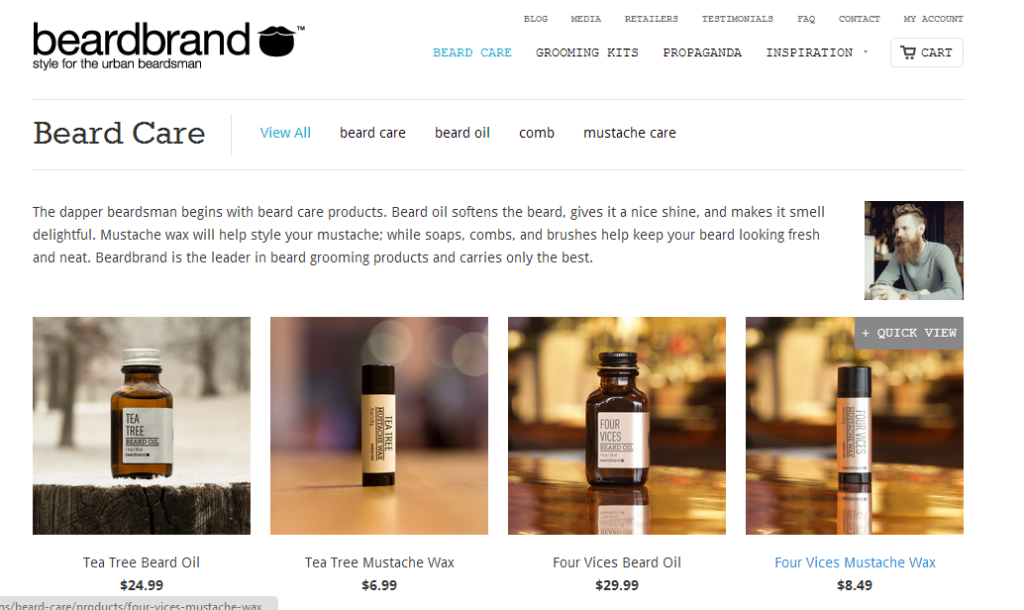Beardbrand is the stuff eCommerce dreams are made of. In under 2 years, founder Eric Bandholz and his team built a business, established a brand and went from $0 to $120k in monthly revenue. Eric credits the Shopify store’s success largely to being transparent and having a strong community of “Urban Beardsmen” who not only love the brand’s products, but the content it produces.
Beardbrand is a great example of an awesome and successful Yotpo store, so I got on the phone with Eric to ask him about the company, his experience and his advice for other store owners. If you’re looking for quick tips to sell more, you won’t find them here. That’s because the secret to Beardbrand’s success is not a complex eCommerce merchandising strategy or expensive marketing plan, it’s simply that they have found a way to connect with and communicate with their community–something Yotpo is all about.
What is Beardbrand?
We foster style for the Urban Beardsman. What that means is we’re trying to create a movement where we allow men to be more confident and comfortable with their beards, if that’s what they choose to do. We don’t just sell stuff: We provide style inspiration alongside beard care products.
How have reviews helped your business?
Yotpo was one of the first apps we installed and it has been tremendous for us. I don’t think we would be as successful as we are without it. Reviews are one of the things that I think legitimately really helped improve our conversion rates.
Reviews really help us understand what the marketplace wants. We get direct responses from our customers, and it’s a way for them to open up to us. It’s a wonderful way for us to understand our current customers and also a wonderful way for future customers to hear what the product is all about–to get through our marketing and descriptions and really see what people think about the products.
What do you know now that you wish you had known when you started?
I wish I knew how successful the store would be. I don’t know if other entrepreneurs are like this, but you always have a little bit of doubt as to how something’s gonna be received or if people will really like it. And if we knew, without a shadow of a doubt, beyond all expectation that it was gonna be as successful as it’s been so far, we could have planned for that.
So you’re saying, “Prepare for the best case scenario.”
Sort of, yeah. Expect success!
You have done such a great job with creating a brand and marketing. Do you have any tips for established stores?
Personally, I’m a little quirky and a little out of left field. I would tell store owners, you gotta let your guard down a little bit; You just gotta be yourself and make your organization be itself as well. You want to create a culture and share with the world what you’re like. Even if you’re kind of serious and dry, share that with the world and you’ll connect with other people who appreciate it. A lot of it is just being authentic and being transparent-show the world who you are and what you are about and then you can connect with people who are like-minded.
Social is a core part of our marketing strategy. We are really active on YouTube, Facebook and tumblr and Reddit. It’s not about trying to come up with deals, it’s about interacting with our customer community on a one-on-one basis, so they can get to know us and we get to know them. It’s about us providing value and service to them.
Can you tell me about an “Aha!” moment where you figured out something that eventually lead to the company’s success?
I probably have one every single day. There isn’t one particular moment that got us going. I think I gradually realized that so much of our company was about the authenticity and communication within the community, so we focused on that. It really influenced our marketing to where we’re not selling items or pushing products or being like “Buy, buy, buy!” but more just building this community.
Maybe it had to do with our e-mail blast we did on Cyber Monday. What I said to the community was like, “Hey guys, you’re gonna be getting a lot of emails from a lot of companies that are giving you sales and discounts and pressuring you into buying, and we’re not about that. When you’re ready to buy, you’ll buy. We believe in our products and don’t want to push you into doing something.”
The response we got from that email was incredible–way more than what we were even expecting. People showed us that an email like that is what they really love. They don’t like being pressured into buying stuff–when they’re ready to buy, they’ll buy.





